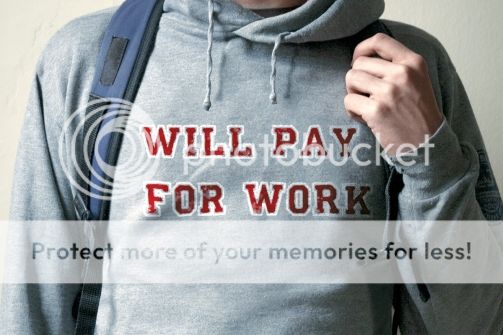So, happy fall. Welcome back to school and back to 100°+ weather in the San Gabriel Valley. California and weather is a thing I have yet to figure out, so, with my east coast stubbornness I continue to drink hot coffee in the morning and wear scarves to class, but I make sure to do my homework in the pool. But I digress.

happy... fall?
It is the start of my second year, my final year of the good ole Grad life, and as I cringe at my mounting loan balance and avoid the questions of “what are you going to do when you graduate?”, I’d like to direct my gaze towards something that is actually happening right this moment, and talk about the unpaid internship.

No, really.
We all have them, and despite your view on the legality/benefit/awesomness/exploitativeness of them, unpaid internships are a reality for most undergrad and graduate students, and a right of passage for anyone interested in a career in the arts. During InternQuest 2012, my own personal search for the ideal nesting ground, I discovered that most cultural organizations in LA county offer internship positions, you just have to dig for them a little. My method was simple: log onto Wikipedia, look up all the arts organizations in LA, search all their websites for opportunities, send out letters and CV’s to all those that look appealing, then hope for the best.
As I searched, I noticed few opportunities were funded, so, like most interns-to-be, I mentally prepared to suck it up, live frugally, and be okay with working for free. Internships have come under close scrutiny over the last few years as organizations (for-profit specifically) have tightened their financial belts staff-wise, and pulled on more unpaid help than normal to compensate. Last September, two interns working for Fox Searchlight Pictures brought suit to the company on claims of labor law violation. Earlier this year, an intern working for Harper’s Bazaar sued Hearst Publications for the same reason.
Ross Perlin, author of Intern Nation writes that: “More and more people after they graduate are feeling they have no choice but to take on unpaid internships… It’s something that you have to do three, four, five times potentially to break into an industry or to get any kind of paying work. It may even be something you do in your 30s or 40s.”
He also states: “I think we may be at the very early stages of a significant backlash against an internship phenomenon that has gone off the rails.”
So where do I stand? I’m not sure. On one hand it is incredibly difficult (and ulcer-inducing) to be a full-time student living entirely on loans in an expensive, expensive state, and have to actually pay (gas, other travel-related expenses) to gain experience in my field. On the other hand, all that experience, if played right, will be entirely necessary to even have a fighting chance in the “real world.” Most arts nonprofits (especially the smaller ones, where my interest lies) do not have the budget to have more than five staffers, let alone be able to stipend their interns. I think that this has to be the place in which Graduate Schools step up to the plate to better support their students in this (seemingly unavoidable) pursuit.

Internships do have their perks - I spent the night at this place!
Recently, The NYU Wasserman Center reported a record number of raised funds to help aid students holding unpaid internships. “[The program] opens the playing field for students who are going through financial struggles, but still want the connections and experiences unpaid internships bring,” a freshman stated. “Being able to cover transportation costs at the very least will help.”
Argument is strong on both sides of this quixotic spectrum. Where do you stand?




